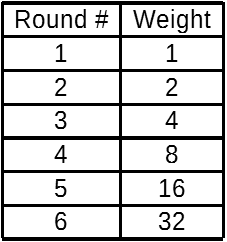Contents
- Index
Brackets in the League Assistant -- Considerations
ELIMINATE ODD GAME HANDLING: Odd game handling can be problematic in that it can let a high placed seed slide into the final rounds of competition. It can eliminate a good player because they had an off week and could not beat their average. It can create complaints from the participants. Perhaps you can think of a few other reasons. The only way to completely eliminate this situation is to create brackets where the number of seeds is a power of 2. This means that the bracket has to have 4, 8, 16, 32, 64, 128, etc. seeds and no other numbers. If the number of seeds in a bracket is not a power of two, you will have one or more odd games in the bracket and will have to do your best to deal with this situation.
WHICH BRACKETS TO CREATE: You can obviously create a bracket for teams and another for players. You can also include subs in the players if you like. However, there are other options. For example, you might consider creating brackets such as the following:
Men's only or Women's only
Over 55 only
Department only for a company league
"Red Sox" fans only
A within league tournament with or without a sponsor
The choices are just about endless. They are fun for the participants and create a challenge outside of the standard league competition. If you have some creative ideas for the use of brackets in your league, please consider passing them on to others by contacting the author of the League Assistant program.
DOUBLE ELIMINATION BRACKETS: The brackets created by the program are single elimination. This means that with each round of competition, half of the participants are eliminated until in the end there are only two final participants which decide the overall winner for the bracket. However, it is possible to create a set of Double Elimination brackets with the program. This is best done where the Bracket Stat is for Scratch or Handicap Series. To do this you would first setup the intial bracket in the program. For example, you could setup a bracket with 16 seeds that will start on week 2 of the competition with a Bracket Stat of Handicap Series. There will be 4 rounds in this bracket and the bracket will finish on week 5. Once the processing is completed for week 2 the first round of this bracket will be completed. You will have 8 winners and 8 losers. You can then setup a losers bracket to start on week 3. Create the losers bracket with 8 seeds. There will be 3 rounds for this losers bracket and it will finish on week 5. Enter the names of the losers from the first bracket as the first round entries for this losers bracket. Once this is done your will have your double elimination brackets, namely the first bracket you created with the 16 seeds starting on week 2 and the second losers bracket with 8 seeds starting on week 3. Both brackets will finish on week 5. You can then create a simple bracket for week 6 with the winners from the two brackets to compete against each other for the final overall winner. This is all more difficult to explain than it is to do. Give it a try if you would like to have double elimination brackets.
PRIZES: The brackets function is setup such that the prize is targeted to the overall winner of the bracket. A future refinement of this program will be to add functionality to the program to facilitate the distribution of prizes to winners of the different rounds of each bracket. However, you do not have to wait for this functionality to be added to the program. You can easily create your own system for prize distribution. Here are some ideas.
Winner Takes All: That is how the program is setup today.
Winner Splits with Runner Up: Create a split such as 80 / 20 and give 80% of the prize to the overall winner and 20% to the runner up.
All Winners Get Something: One simple way of doing this is to assign a weight to each round. Here is a weighting scale you can use.

Here is how you could use these weights with a 16 seed bracket to create a prize distribution.

The weights are multiplied times the number of matches for each round. The sum of this column of weight times matches is 32. With each participant paying $5, the overall prize for this bracket is $80. The $80 is divided by the 32 which yields a value of $2.50 for each unit of weight. The prize for round 1 is then $2.50, for round 2 is $5.00 ($2.50 times a weight of 2), for round 3 is $10 ($2.50 times a weight of 4), and for round 4 is $20 ($2.50 times a weight of 8). A simple system which create as prize for all winners. Obviously you can play around with the weights for each round to create any sort of distribution you would like. If you have questions about this system or would like help creating a custom system for your league brackets, please contact the author of this program.

